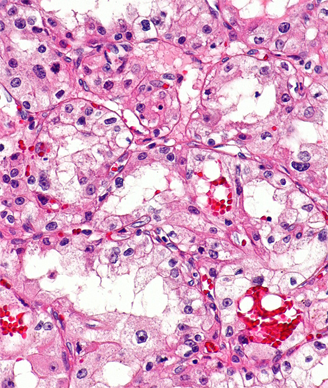Diabetes Linked With Poorer RCC Survival
Among patients with clear cell renal cell carcinoma who had undergone nephrectomy, patients with diabetes were found to have a significantly decreased cancer-specific and overall survival.
Micrograph of clear cell RCC; source: Nephron, Wikimedia Commons

Among patients with clear cell renal cell carcinoma (RCC) who had undergone nephrectomy, those patients with diabetes were found to have a significantly decreased cancer-specific and overall survival compared with those patients without diabetes.
“These findings underscore the importance of considering the effect of diabetes mellitus among other comorbidities on outcomes during risk stratification in RCC,” wrote Sarah P. Psutka, MD, of the department of urology at Mayo Clinic, Rochester, Minn., and colleagues in the Journal of Urology.
In recent years, the incidence of both RCC and diabetes has increased, according to information in the study. However, large studies examining the association between diabetes and RCC had been previously lacking.
The study included 1,964 patients who underwent nephrectomy for clear cell RCC between 1990 and 2008. In the group there were 257 patients (13%) with diabetes at the time of surgery who were matched 1:2 to patients without diabetes. The researchers then compared cancer-specific and overall survival.
Patients with diabetes were found to be older, with a greater degree of comorbidity, and were more likely to smoke and have worse performance status.
Among the matched patients, 229 experienced progression of their disease at a median of 1.5 years post-surgery. No significant difference in 5-year progression-free survival was found between patients with diabetes and those without (72% vs 76%).
Cancer-specific survival analysis found that 149 patients died from RCC. In a univariate analysis, there was no statistically significant increase in risk of death from RCC between the two groups. However, a multivariable analysis that adjusted for Charlson comorbidity index and BMI found that patients with diabetes had a 55% increased risk for death from RCC (P = .017).
Finally, the researchers examined differences in overall survival; 393 patients had died at a median of 4.3 years after surgery. Diabetes was found to be significantly associated with an increased risk for all-cause mortality on both the univariate (HR = 1.57; P < .001) and multivariate analysis (HR = 1.32; P = .014).
The researchers noted in their discussion that the retrospective study design limits their ability to test a causal relationship between diabetes and decreased overall survival.
“The results from this matched cohort study support the preexisting evidence from prior retrospective cohort studies: that diabetes mellitus is independently associated with inferior outcomes in patients with RCC, specifically for clear cell RCC patients,” the researchers wrote. “At this time, additional research is needed to determine whether this effect is associated with diabetic severity and, as such, if this impact may be mitigated with tighter glycemic control.”